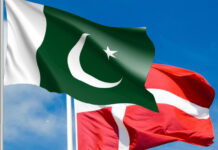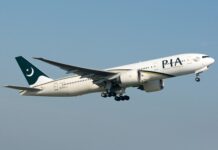ISLAMABAD: State Minister of Finance and Economic Affair Division Rana Afzal on Tuesday denied that Pakistani nationals had kept $ 200 billion in Swiss banks.
Rana Afzal informed the Senate Standing Committee on Finance that Swiss government officials are not confirming that Pakistani nationals’ had kept their wealth in Swiss Banks.
“I cannot validate this statement in front of this Committee”, Rana Afzal categorically stated while responding to Senator Ilyas Balour’s query.
In 2014, former finance minister Ishaq Dar had informed the lower house while quoting to Swiss banker and a former Swiss government minister that at least $ 200 billion of ‘Pakistani money’ was stashed away in Swiss banks.
Federal Board of Revenue (FBR) officials while briefing to Committee stated that government of Switzerland and Pakistan had signed an exchange of information agreement a year ago in which it is mandatory for both of countries to provide tax related information to each other when required.
This agreement has been implemented from January 1, 2018, and both of countries can obtain tax-related information from each other.
Rana Afzal stated that Swiss government will not provide all individual information. The information will confine to those Pakistanis who have been under investigation in Pakistan.
The Committee chairman Senator Saleem Mandviwala stated that Senator Ishaq Dar had given the false statement in Parliament regarding the Swiss banks issue. He further questioned that will the government be able to get information prior to January 2018 upon this; the State Minister for Finance Rana Afzal said that we cannot get previous information from Swiss government under the agreement.
The member of Committee Senator Ilyas Balour on this occasion regarded the agreement useless since the Swiss government will not provide previous information.
It is necessary to mention here that former finance minister Ishaq Dar in a written reply told the lower house that the government was engaging with Swiss authorities to get the $ 200 billion, hidden away by various Pakistani nationals.
Dar had quoted statements of a Swiss banker and a former Swiss government minister that “One of the directors of Credit Suisse AG stated on the record that $ 97 billion worth of Pakistani capital was deposited only in his bank. Similarly, a former Swiss foreign minister Micheline Calmy-Rey is reported to have put the amount of Pakistani money hidden in Switzerland at $ 200 billion — a statement that was never contradicted,” he revealed in 2014.
Saying that he believed the figures were correct, Dar said the situation called for immediate corrective action. To put the enormity of this find into perspective, Pakistan’s total external debt stands at $ 150 billion and its gross domestic product is said to be around $ 300 billion. The country can, theoretically, pay off all its debt with the money in Swiss banks and still have nearly a quarter of it left over.
Switzerland has traditionally been the oldest, the most formidable and the most popular secret banking jurisdiction, attracting massive sums of tax-evaded money from across the world into its banks with numbered-accounts. Since 2009, the US and EU have consistently been pressing Switzerland and other tax havens to allow international tax administrations to track illegal funds parked in their secretive banks.
Moreover, Rana Afzal informed the Senate Committee on Finance, Revenue, and Economic Affairs that there is no need at the moment to go to IMF for assistance in the current financial year.
The Minister said that the government was well in position to meet all the debt and other liabilities, however, added it had to take loans for development.
Meanwhile, a senior official from Ministry of Finance informed the committee that “the indicators were not bad, so we were not in rush to approach IMF” adding the option of going to IMF could be taken if there was a problem in the balance of payment system.
He informed the committee that the targets and indicators were well in accordance with the IMF expectations adding another review with IMF was scheduled in April this year.
Meanwhile, about payment of external debts, the committee was informed that the government had to pay back $ 6 billion debt during this year, out of which $ 2.4 billion had already been paid and remaining $ 3.6 billion is to be paid by June 2018.
However, the Chairman asked for providing details of money inflows and outflows of the country during next meeting.
On issuance of bonds, the committee was informed that road-shows were conducted in Dubai, Boston, London and New York from November 23 to November 28, 2017, to launch Sukuk and Eurobond.
The government earned $ 2.5 billion, including $ 1.5 billion through the launch of Eurobond and $ 1 billion from Sukuk, they said adding that the Sukuk was provided at 5.62 per cent whereas Eurobond was given at 6.875 per cent markup rate.
On the occasion, Rana Afzal said that this time the bonds were issued at very good rates and it was also acknowledged by many countries.
On the Regulatory Duty, the committee suggested that issue of RD on tyres should also be resolved and suggested that the FBR should convene a meeting with stakeholders which would be chaired by Senator Kamil Ali Agha to resolve the issue.
On refund issues, the committee was informed that three out of four refund issues have been resolved while another was in process as there was some unverified information.
Meanwhile, Auditor General of Pakistan Revenues (AGPR) gave a detailed presentation to the committee about the transfer of pensioners to Direct Credit System (DCS). The representatives of
AGPR informed the committee that it would take about two years to provide pension through DCS.
























